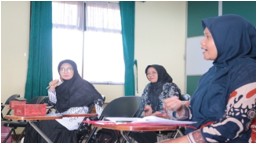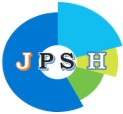Empowering Science Teachers to Implement ESD through Project-Based Learning: A Community Service Program for Professional Development
DOI:
https://doi.org/10.32938/jpsh.v4i2.10224Keywords:
ESD, PjBL, Science Learning, Teacher professional developmentAbstract
The integration of Education for Sustainable Development (ESD) into science instruction remains limited in secondary schools due to teachers’ insufficient understanding and practical skills. To address this, a professional development program was conducted to enhance the capacity of junior and senior high school science teachers to implement ESD through project-based learning (PjBL). The program consisted of three phases: conceptual enrichment, on-the-job training, and microteaching. A total of 12 science teachers completed the program. During the microteaching phase, one teacher served as a model by delivering an ESD-integrated lesson to 24 students, focusing on a solar energy project. Data were collected through facilitator observations, teacher reflections, and post-program questionnaires completed by both teachers and students. The findings indicate improved teacher understanding of ESD principles, greater ability to design PjBL activities linked to sustainability goals, and increased instructional confidence. Student feedback revealed high levels of engagement, satisfaction, and awareness of sustainability issues. These outcomes suggest that structured and practice-based professional development can effectively support science teachers in integrating ESD into classroom practice. Expanding similar programs may foster transformative science education and help prepare students to take informed action on sustainability challenges.
References
Budiati, I., Hayat, M. S., & Fatonah, S. (2025). Potensi Integrasi STEAM-SDGs dalam Pembelajaran Proyek IPAS di SMK Bina Utama Kendal. Jurnal Pendidikan MIPA, 15(1), 148–155. https://doi.org/10.37630/jpm.v15i1.2451.
Cahyani, F. H., Widiyanto, B., Arfiani, Y., & Kunci, K. (2025). Pengetahuan Guru IPA SMP terhadap Sustainable Development Goals (SDGs) dalam Mendukung Education for Sustainable Development (ESD) pada Pembelajaran IPA. Jurnal Pendidikan MIPA Pancasakti, 9, 6–16. http://e-journal.ups.ac.id/index.php/jpmp.
Chand, S. P. (2023). Constructivism in Education: Exploring the Contributions of Piaget, Vygotsky, and Bruner. International Journal of Science and Research (IJSR), 12(7), 274–278. https://doi.org/10.21275/sr23630021800.
Chiu, S. K., & Lee, J. (2019). Innovative experiential learning experience: Pedagogical approach adopting Kolb's learning cycle at higher education in Hong Kong. Cogent Education, 6(1). https://doi.org/10.1080/2331186X.2019.1644720.
Cholifah, A. N., Asib, A., & Suparno, S. (2020). Investigating Teachers' Perceptions of Reflective Peer Observation to Promote Professional Development. JEES (Journal of English Educators Society), 5(1), 89–93. https://doi.org/10.21070/jees.v5i1.382.
Chopra, A., & Banerjee, P. (2022). Authentic Learning for Developing Key Competencies in Sustainability: A Review. Journal of Positive School Psychology, 6(3), 9021–9034. http://journalppw.com.
Coen, E. (2025). Situated Learning in Libraries: A Conceptual Framework for Integrating Research Skills into Performing Arts Curricula. Performing Arts Resources, 37(2), 4–25. https://doi.org/10.3998/par.7439.
Craps, M., & Brugnach, M. (2021). Experiential Learning of Local Relational Tasks for Global Sustainable Development by Using a Behavioral Simulation. Frontiers in Sustainability, 2. https://doi.org/10.3389/frsus.2021.694313.
Darling-Hammond, L., Hyler, M. E., & Gardner, M. (2017). Effective Teacher Professional Development. Palo Alto, CA: Learning Policy Institute. https://learningpolicyinstitute.org/product/teacher-prof-dev
Demssie, Y. N., Biemans, H. J. A., Wesselink, R., & Mulder, M. (2023). Fostering students' systems thinking competence for Sustainability by using multiple real-world learning approaches. Environmental Education Research, 29(2), 261–286. https://doi.org/10.1080/13504622.2022.2141692.
Dianita, B. (2023). Problem-Based Learning Model with Experiential Learning to Increase Creative Thinking and Critical Thinking Ability. Jurnal Penelitian Dan Pengembangan Pendidikan, 7(2), 328–335. https://doi.org/10.23887/jppp.v7i2.62254.
Fullan, M., & Langworthy, M. (2014). A Rich Seam: How New Pedagogies Find Deep Learning. London: Pearson.
Hayes, K. N., & Allen, C. D. (2025). Understanding Science Teacher Learning as Situated in Organizational Contexts: Introduction to the Special Issue. Science Education, 109(4), 993–1001. https://doi.org/10.1002/sce.21960.
Jumaidin, J., Sabrina, S., Muhammad, M., & Harjoko, S. (2025). Strengthening Students' Problem-Solving Skills Through Project-Based Learning Models Based on Environmental Issues in the Era of Sustainable Education. Jurnal Pendidikan IPS, 15(2), 427–438. https://doi.org/10.37630/jpi.v15i2.3018.
Karakaş, A., & Yükselir, C. (2025). Peer and instructor feedback on pre-service EFL teachers’ reflection types and levels in video-mediated microteaching. Studies in Educational Evaluation, 85. https://doi.org/10.1016/j.stueduc.2025.101457.
Marwa, N. W. S., Purwanto, A., & Usman, H. (2025). The Effect of Project-Based Learning Model Assisted by ESD-Based Student Worksheets on Critical Thinking Skills. Jurnal Elementaria Edukasia, 8(1), 3593–3605. https://doi.org/10.31949/jee.v8i1.12692.
Mezirow, J. (2018). Transformative Learning Theory (K. Illeris, Ed.; 2nd ed., pp. 114–128). Routledge.
Mochizuki, Y., & Fadeeva, Z. (2010). Competences for Sustainable Development and Sustainability: Significance and Challenges for ESD. International Journal of Sustainability in Higher Education, 11(4), 391–403. https://doi.org/10.1108/14676371011077603.
Nugroho, U. E., Nugroho, A. S., Hayat, M. S., & Patonah, S. (2025). Bridging Sustainability and Pedagogy: A Narrative Review of Education for Sustainable Development (ESD) Implementation in Indonesian Science Education. Prisma Sains : Jurnal Pengkajian Ilmu Dan Pembelajaran Matematika Dan IPA IKIP Mataram, 13(2), 348–374. https://doi.org/10.33394/j-ps.v13i2.15116.
Purbasari, I., Yusuf, M., Subagya, Marmoah, S., & Alali, A. A. (2025). Development of a community-based social collaborative e-learning model for adaptability of higher education students in Indonesia. Frontiers in Education, 10. https://doi.org/10.3389/feduc.2025.1487484.
Purnamasari, S., & Hanifah, A. N. (2021). Education for Sustainable Development (ESD) dalam Pembelajaran IPA. JKPI: Jurnal Kajian Pendidikan IPA, 1(2), 53–61. https://doi.org/https://doi.org/10.52434/jkpi21281.
Purnamasari, S., & Nurawaliyah, S. (2023). Studi Literatur: Penilaian Kompetensi Keberlanjutan dan Hasil Belajar Education for Sustainable Development (ESD). Jurnal Pendidikan Uniga, 17(1), 686–698. https://doi.org/https://doi.org/10.52434/jpu.v17i1.2553.
Purnamasari, S., Suhendi, F. A. F., & Zulfah, N. L. N. (2022). Implementasi Education for Sustainable Development (ESD) dalam pembelajaran IPA di Kabupaten Garut: sebuah studi pendahuluan. Jurnal Kajian Pendidikan IPA, 2(1), 105–110. https://doi.org/https://doi.org/10.52434/jkpi11573.
Redman, A., Wiek, A., & Barth, M. (2021). Current Practice of Assessing Students' Sustainability Competencies: A Review of Tools. Sustainability Science, 16(1), 117–135. https://doi.org/10.1007/s11625-020-00855-1.
Ridge, B. L., & Lavigne, A. L. (2020). Improving instructional practice through peer observation and feedback. Education Policy Analysis Archives, 28, 1–32. https://doi.org/10.14507/EPAA.28.5023.
Rosmiati, R., Satriawan, M., Fanny, A., Satianingsih, R., Utari, S., Ningsih, E., Rasyiida, G., Anandha, A., & Anam, P. (2025). Design of a reflective, Sustainable development education-oriented project-based learning platform for elementary school students in Indonesia. Multidisciplinary Science Journal, 7(9). https://doi.org/10.31893/multiscience.2025444.
Saborido, F. M. O., Domínguez-Montes, J. A., Benjumea, J. M. C., & González-Calvo, G. (2024). Peer Observation of Teaching in Higher Education: Systematic Review of Observation Tools. Educational Process: International Journal, 13(1), 84–101. https://doi.org/10.22521/edupij.2024.131.6.
Setiawan, H., Surtikanti, H. K., Kusnadi, K., & Riandi, R. (2023). Sustainability Awareness, Engagement, and Perception of Indonesian High School Students during Sustainability Project-Based Learning Implementation in Biology Education. Jurnal Penelitian Pendidikan IPA, 9(6), 4227–4236. https://doi.org/10.29303/jppipa.v9i6.3971.
Setyowati, Y., Kaniawati, I., Sriyati, S., Nurlaelah, E., & Hernani, H. (2022). The Development of Science Teaching Materials Based on the PjBL-STEM Model and ESD Approach on Environmental Pollution Materials. Jurnal IPA & Pembelajaran IPA, 6(1), 45–53. https://doi.org/10.24815/jipi.v6i1.23571.
Shutaleva, A. (2023). Experiential learning as a principle of environmental education. E3S Web of Conferences, 420. https://doi.org/10.1051/e3sconf/202342010010.
UNESCO. (2017). Education for Sustainable Development Goals: Learning Objectives. UNESCO.

Downloads
Published
How to Cite
Issue
Section
License
Copyright (c) 2025 Shinta Purnamasari, Ayu Ratna Santika, Wiwit Yuli Lestari, Nawa Hilmi Syarifatoha, Siti Nazila Anwar, Annisa Alyatunnawal, Sabrina Aprilla Safarizi, Aceng Muhammad Rohmat Hidayat, Raihan Muhammad Ramdan

This work is licensed under a Creative Commons Attribution 4.0 International License.














